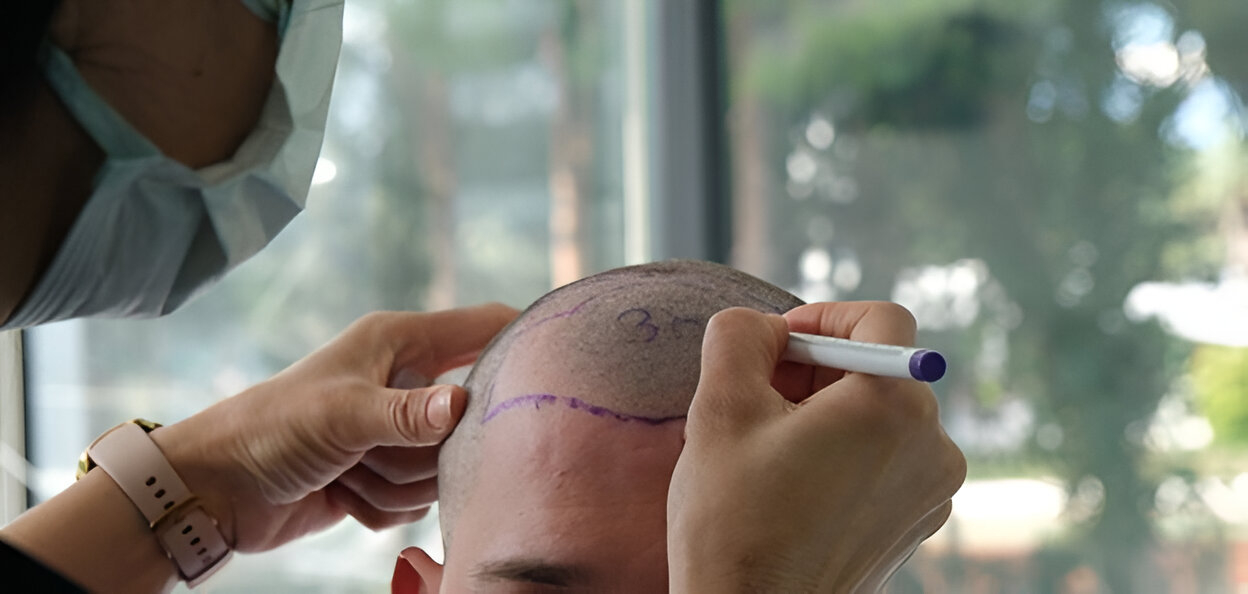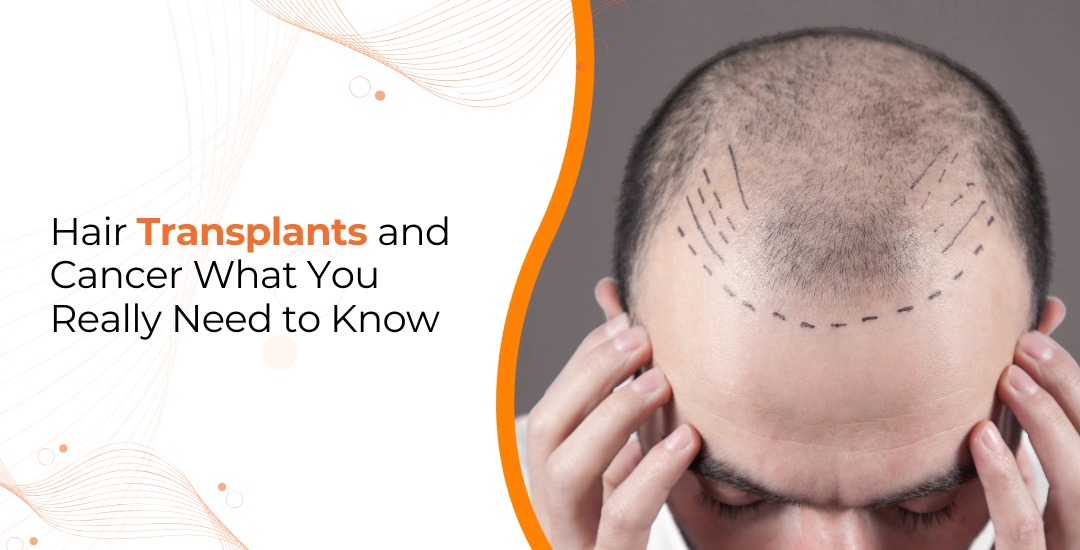Hair loss is more than a cosmetic issue—it’s deeply personal. It affects your self-esteem, changes how you present yourself to the world, and can even impact your emotional health. Thankfully, modern hair restoration surgery offers a lifeline to those experiencing thinning hair, receding hairlines, or bald patches. It’s safe, minimally invasive, and results are impressively natural. However, when patients walk into our clinics at Hair Creations, a question we often hear is: Can hair transplant cause cancer?
It’s a fair concern. In today’s world, people are more health-conscious than ever—and with good reason. We’re constantly exposed to stories about procedures gone wrong, side effects of certain medications, or long-term impacts of cosmetic treatments. But when it comes to hair transplants, it’s important to separate fear from fact. In this blog, we’ll walk you through everything you need to know about the safety of hair transplants, particularly in relation to cancer. We’ll explore what actually happens during a transplant, what risks are real (and which aren’t), and how to ensure your experience is as safe and effective as possible.
Common Concerns About Hair Transplants and Cancer

Let’s start with the main question: can getting a hair transplant cause cancer?
The short and reassuring answer is no. There is no scientific or clinical evidence to suggest that a hair transplant procedure—when performed correctly—can lead to cancer. The myth likely stems from general anxiety around surgical procedures or confusion with other medical treatments that do involve radiation or carcinogenic exposure.
To understand why this fear is unfounded, it helps to look at how the procedure works. In a hair transplant, particularly methods like Bio-FUE (Follicular Unit Extraction), your own hair follicles are moved from one part of the scalp (usually the back or sides, where hair is more resistant to thinning) to the balding areas. There are no foreign substances being implanted, no radiation involved, and no drugs used that are linked to carcinogenic effects. It’s your own tissue being relocated.
In addition, supporting therapies such as PRP (Platelet-Rich Plasma) and GFC (Growth Factor Concentrate) treatments involve taking a small amount of your own blood, processing it to concentrate the healing components, and injecting it back into your scalp. These methods use completely natural substances from your own body and are not only safe but have shown promising results in hair regrowth and scalp healing.
No reputable medical source or regulatory body—including the FDA or the American Academy of Dermatology—has ever linked hair transplant surgery to cancer. The procedures are done at skin level, with very shallow incisions, and do not interfere with organs, lymph nodes, or cellular structures associated with cancer development.
Still wondering if a hair transplant is right for you? Talk to our specialists at Hair Creations for a free, informative consultation no pressure, just honest guidance.
Are There Any Risks Associated with Hair Transplants?
Just because hair transplants don’t cause cancer doesn’t mean they’re completely without risk. Like any medical procedure, especially surgical ones, there are a few potential side effects. However, they are generally minor and easily manageable—especially when your procedure is performed in a certified clinic by a trained professional.
Common short-term effects include minor swelling, mild discomfort, and redness around the transplant and donor areas. Some patients may experience scabbing or a tight feeling on the scalp for a few days following the surgery. These symptoms typically subside within a week. In rare cases, a minor infection may occur, but this is usually a result of poor aftercare or procedures done in unsanitary environments. At Hair Creations, we strictly adhere to sterile surgical standards and provide detailed post-procedure instructions to ensure optimal healing.
For patients opting for PRP or GFC treatments, side effects are minimal. Since these procedures use your own blood components, the body accepts them easily. The injection process may cause slight tenderness or redness for a few hours, but that’s usually the extent of discomfort.
What’s most important is to understand that complications arise primarily when the procedure is performed by underqualified technicians or in facilities that don’t meet medical standards. That’s why choosing the right clinic is essential—not just for results, but for your long-term health and peace of mind.
The Importance of Choosing a Qualified Surgeon
If there’s one thing that significantly influences the success and safety of your hair transplant in Hyderabad (or anywhere), it’s who performs it. At Hair Creations, we pride ourselves on being a clinic where safety, experience, and ethics come first. Our team consists of certified dermatologists, hair transplant surgeons, anesthetists, and laser specialists—all working together to deliver medically sound outcomes.
With specialized experience in Male Hair Transplant, Female Hair Transplant, and non-surgical hair restoration, we approach each case with precision and personalization. The consultation process at Hair Creations isn’t rushed—we take time to understand your hair loss history, medical background, expectations, and lifestyle. Only then do we recommend a treatment plan tailored to your unique needs.
Contrast that with unregulated clinics offering “quick fix” solutions at unbelievably low costs. These places often cut corners on hygiene, staff training, and patient care—all of which can lead to disappointing results, unnecessary pain, or in extreme cases, infections and scarring. None of those outcomes involve cancer—but they’re certainly worth avoiding.
At Hair Creations, whether you’re visiting our clinic in Hyderabad, Warangal, Vijayawada, or any of our locations across Andhra Pradesh and Telangana, you’ll receive the same gold standard of care. We invest in FDA-approved equipment, ongoing training, and patient education because we believe your confidence is worth protecting.
Ready to explore hair transplant options with a clinic that puts your safety first? Find your nearest Hair Creations location today.
Conclusion: Hair Transplants and Your Health
Let’s wrap it all up: Can Hair Transplant Cause Cancer?
The answer is a firm, confident no.
Hair restoration surgery, when performed by qualified professionals using safe methods, is not associated with cancer. In fact, it’s one of the safest cosmetic surgeries available today. With advanced techniques like Bio-FUE, PRP, and GFC, and a medically-led approach, patients can achieve natural-looking results without compromising their health.
At Hair Creations, we take these concerns seriously—because we know how important it is for you to feel informed and confident before making any decision. From your first consultation to your final follow-up, we ensure that your care is based on transparency, compassion, and proven results.
Hair restoration isn’t just about looking better—it’s about feeling better. And with the right team by your side, you don’t have to choose between beauty and safety.
FAQs
Are hair transplant procedures safe?
Yes, absolutely. When performed by certified experts in hygienic conditions, hair transplants are very safe. At Hair Creations, patient safety is our top priority.
Can hair transplants be performed on all types of hair loss?
Not all types. Hair transplants work best for pattern baldness. During your consultation, our team will evaluate whether you’re a suitable candidate or recommend alternative treatments if needed.
What is the recovery time after a hair transplant?
Most patients can return to regular activities within 2 to 3 days. Full hair growth typically occurs over a 6–12 month period, depending on the individual and the method used.
Can hair transplant surgery lead to infection?
Infection is rare and usually occurs only when post-op care is ignored or if the procedure was performed in an unhygienic environment. At Hair Creations, we follow strict sterilization and aftercare protocols.
Can a hair transplant help with bald spots caused by stress?
Yes, if the hair loss has stabilized. Transplants can restore density in those areas. We often recommend combining this with PRP or GFC therapy to strengthen existing follicles and promote healthier growth.
Still have questions? Reach out to our expert care team at Hair Creations and take your first step toward confident, cancer-free hair restoration.
References:
- American Academy of Dermatology – Hair Transplant Procedures
- National Cancer Institute – Common Cancer Myths

